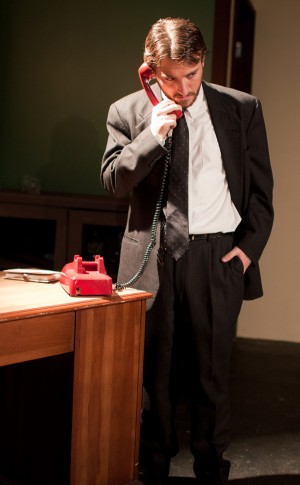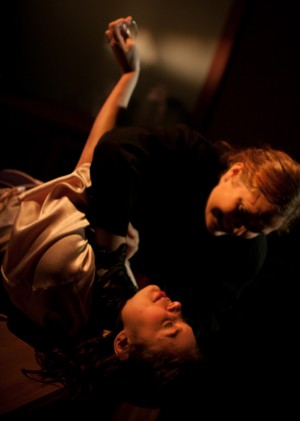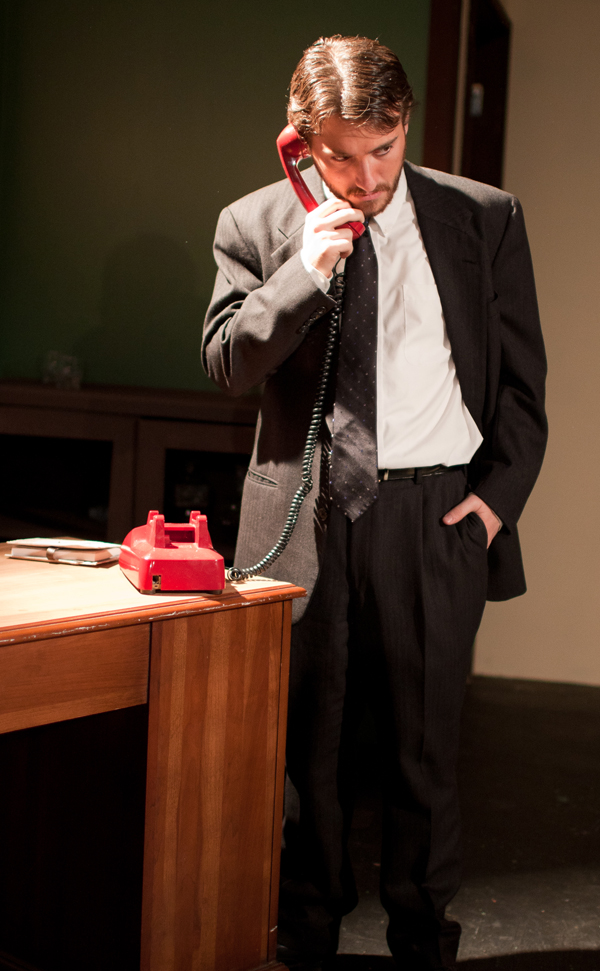
Wandering Minds’ production of Frederick Knott’s Dial M for Murder was very nearly the show that never was. The troupe had planned on performing Ira Levin’s thriller Deathtrap until the powers-that-be halted the production and forced them to look elsewhere. With the play already cast and the show only 5 weeks from opening night, director Matthew Hajek (CAS ’12) selected Dial M for its Hitchcockian thriller pedigree and workable cast numbers. There is also considerable irony in selecting this particular story for a last-minute production given its plot: when the best laid plans go to waste, you must make do with what you have. Not only does the cast of Dial M manage to pull off a convincing show, but they inject a relatively stagnant play with layers of comedy and suspense to keep the show dynamic throughout.
Phil Silberman (CAS ’11) stands out as murderous and conniving husband Tony Wendice, speaking with an irreverent Don Draper-esque speech pattern that matches the dialogue’s mid-century values. He is matched by the demure Maggie Scull (CAS ’11), who manages to portray startled, bewildered, and nearly-dead adultress Margot Wendice without falling prey to the often sexist dialogue where, like in nearly all of Hitchcock’s films, the women tend to get confused easily. The play hinges on the core couple’s believability, and Silberman and Scull create a jealous tension that permeates throughout the entire performance.
Almost in spite of its reputation as a thriller, the pacing of the play is incredibly tedious. Set entirely in the Wendices’ living room with incredibly dialogue–heavy scenes, the story tends to sag when it gets tangled up in the details. However, Wandering Minds does its best to keep the plot lively, slipping in the laughs–including a sight-gag involving an entirely-too-short blazer and a policeman unabashedly carrying a handbag outside — whenever possible.

Movement is also prominent, as the actors make the most of their limited space to keep eyes moving and the plot rolling. Phone calls are also opportunities for scenery changes, as characters alternate between two onstage telephone wings to give the allusion of different locations. The movement breaks up the dialogue and keeps the audience in focus even when the thrills aren’t in full force.
One of the challenges the production’s short schedule forced it to deal with is a gender-swap of C.A. Lesgate, turning the con man who attempts to strangle Margot Wendice into a desperate and amoral woman. While Liz Jerome (CAS ’12) performs with force and determination, the change seems discordant given the man-in-charge, woman-as-victim plot. Call me a purist, but the female Lesgate just doesn’t have the same threat as the lurking and hulking man from the screenplay. Still, the strangulation scene is not without intensity, and Jerome’s acting carries the gender change well.
In short, Dial M for Murder is thrilling, funny, and well-performed, almost as if it was the intended play from the outset. Wandering Minds not only makes due with what it has, but pulls off a compelling story that manages to be playful at the same time. Who needs best-laid plans?

